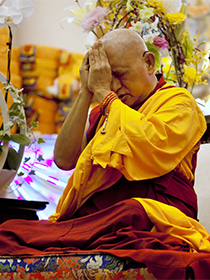- Home
- FPMT Homepage
Foundation for the Preservation of the Mahayana Tradition
The FPMT is an organization devoted to preserving and spreading Mahayana Buddhism worldwide by creating opportunities to listen, reflect, meditate, practice and actualize the unmistaken teachings of the Buddha and based on that experience spreading the Dharma to sentient beings. We provide integrated education through which people’s minds and hearts can be transformed into their highest potential for the benefit of others, inspired by an attitude of universal responsibility and service. We are committed to creating harmonious environments and helping all beings develop their full potential of infinite wisdom and compassion. Our organization is based on the Buddhist tradition of Lama Tsongkhapa of Tibet as taught to us by our founders Lama Thubten Yeshe and Lama Thubten Zopa Rinpoche.
- Willkommen
Die Stiftung zur Erhaltung der Mahayana Tradition (FPMT) ist eine Organisation, die sich weltweit für die Erhaltung und Verbreitung des Mahayana-Buddhismus einsetzt, indem sie Möglichkeiten schafft, den makellosen Lehren des Buddha zuzuhören, über sie zur reflektieren und zu meditieren und auf der Grundlage dieser Erfahrung das Dharma unter den Lebewesen zu verbreiten.
Wir bieten integrierte Schulungswege an, durch denen der Geist und das Herz der Menschen in ihr höchstes Potential verwandelt werden zum Wohl der anderen – inspiriert durch eine Haltung der universellen Verantwortung und dem Wunsch zu dienen. Wir haben uns verpflichtet, harmonische Umgebungen zu schaffen und allen Wesen zu helfen, ihr volles Potenzial unendlicher Weisheit und grenzenlosen Mitgefühls zu verwirklichen.
Unsere Organisation basiert auf der buddhistischen Tradition von Lama Tsongkhapa von Tibet, so wie sie uns von unseren Gründern Lama Thubten Yeshe und Lama Thubten Zopa Rinpoche gelehrt wird.
- Bienvenidos
La Fundación para la preservación de la tradición Mahayana (FPMT) es una organización que se dedica a preservar y difundir el budismo Mahayana en todo el mundo, creando oportunidades para escuchar, reflexionar, meditar, practicar y actualizar las enseñanzas inconfundibles de Buda y en base a esa experiencia difundir el Dharma a los seres.
Proporcionamos una educación integrada a través de la cual las mentes y los corazones de las personas se pueden transformar en su mayor potencial para el beneficio de los demás, inspirados por una actitud de responsabilidad y servicio universales. Estamos comprometidos a crear ambientes armoniosos y ayudar a todos los seres a desarrollar todo su potencial de infinita sabiduría y compasión.
Nuestra organización se basa en la tradición budista de Lama Tsongkhapa del Tíbet como nos lo enseñaron nuestros fundadores Lama Thubten Yeshe y Lama Zopa Rinpoche.
A continuación puede ver una lista de los centros y sus páginas web en su lengua preferida.
- Bienvenue
L’organisation de la FPMT a pour vocation la préservation et la diffusion du bouddhisme du mahayana dans le monde entier. Elle offre l’opportunité d’écouter, de réfléchir, de méditer, de pratiquer et de réaliser les enseignements excellents du Bouddha, pour ensuite transmettre le Dharma à tous les êtres. Nous proposons une formation intégrée grâce à laquelle le cœur et l’esprit de chacun peuvent accomplir leur potentiel le plus élevé pour le bien d’autrui, inspirés par le sens du service et une responsabilité universelle. Nous nous engageons à créer un environnement harmonieux et à aider tous les êtres à épanouir leur potentiel illimité de compassion et de sagesse. Notre organisation s’appuie sur la tradition guéloukpa de Lama Tsongkhapa du Tibet, telle qu’elle a été enseignée par nos fondateurs Lama Thoubtèn Yéshé et Lama Zopa Rinpoché.
Visitez le site de notre Editions Mahayana pour les traductions, conseils et nouvelles du Bureau international en français.
Voici une liste de centres et de leurs sites dans votre langue préférée
- Benvenuto
L’FPMT è un organizzazione il cui scopo è preservare e diffondere il Buddhismo Mahayana nel mondo, creando occasioni di ascolto, riflessione, meditazione e pratica dei perfetti insegnamenti del Buddha, al fine di attualizzare e diffondere il Dharma fra tutti gli esseri senzienti.
Offriamo un’educazione integrata, che può trasformare la mente e i cuori delle persone nel loro massimo potenziale, per il beneficio di tutti gli esseri, ispirati da un’attitudine di responsabilità universale e di servizio.
Il nostro obiettivo è quello di creare contesti armoniosi e aiutare tutti gli esseri a sviluppare in modo completo le proprie potenzialità di infinita saggezza e compassione.
La nostra organizzazione si basa sulla tradizione buddhista di Lama Tsongkhapa del Tibet, così come ci è stata insegnata dai nostri fondatori Lama Thubten Yeshe e Lama Zopa Rinpoche.
Di seguito potete trovare un elenco dei centri e dei loro siti nella lingua da voi prescelta.
- 欢迎 / 歡迎
简体中文
“护持大乘法脉基金会”( 英文简称:FPMT。全名:Foundation for the Preservation of the Mahayana Tradition) 是一个致力于护持和弘扬大乘佛法的国际佛教组织。我们提供听闻,思维,禅修,修行和实证佛陀无误教法的机会,以便让一切众生都能够享受佛法的指引和滋润。
我们全力创造和谐融洽的环境, 为人们提供解行并重的完整佛法教育,以便启发内在的环宇悲心及责任心,并开发内心所蕴藏的巨大潜能 — 无限的智慧与悲心 — 以便利益和服务一切有情。
FPMT的创办人是图腾耶喜喇嘛和喇嘛梭巴仁波切。我们所修习的是由两位上师所教导的,西藏喀巴大师的佛法传承。
繁體中文
護持大乘法脈基金會”( 英文簡稱:FPMT。全名:Found
ation for the Preservation of the Mahayana Tradition ) 是一個致力於護持和弘揚大乘佛法的國際佛教組織。我們提供聽聞, 思維,禪修,修行和實證佛陀無誤教法的機會,以便讓一切眾生都能 夠享受佛法的指引和滋潤。 我們全力創造和諧融洽的環境,
為人們提供解行並重的完整佛法教育,以便啟發內在的環宇悲心及責 任心,並開發內心所蘊藏的巨大潛能 — 無限的智慧與悲心 – – 以便利益和服務一切有情。 FPMT的創辦人是圖騰耶喜喇嘛和喇嘛梭巴仁波切。
我們所修習的是由兩位上師所教導的,西藏喀巴大師的佛法傳承。 察看道场信息:
- FPMT Homepage
- News/Media
-
- Study & Practice
-
-
- About FPMT Education Services
- Latest News
- Programs
- New to Buddhism?
- Buddhist Mind Science: Activating Your Potential
- Heart Advice for Death and Dying
- Discovering Buddhism
- Living in the Path
- Exploring Buddhism
- FPMT Basic Program
- FPMT Masters Program
- FPMT In-Depth Meditation Training
- Maitripa College
- Lotsawa Rinchen Zangpo Translator Program
- Universal Education for Compassion & Wisdom
- Online Learning Center
-
- Prayers & Practice Materials
- Overview of Prayers & Practices
- Full Catalogue of Prayers & Practice Materials
- Explore Popular Topics
- Benefiting Animals
- Chenrezig Resources
- Death & Dying Resources
- Lama Chopa (Guru Puja)
- Lama Zopa Rinpoche: Compendium of Precious Instructions
- Lama Zopa Rinpoche: Life Practice Advice
- Lama Zopa Rinpoche Practice Series
- Lamrim Resources
- Mantras
- Prayer Book Updates
- Purification Practices
- Sutras
- Thought Transformation (Lojong)
- Audio Materials
- Dharma Dates - Tibetan Calendar
- Translation Services
- Publishing Services
- Ways to Offer Support
- Prayers & Practice Materials
-
- Teachings and Advice
- Find Teachings and Advice
- Lama Zopa Rinpoche Advice Page
- Lama Zopa Rinpoche: Compendium of Precious Instructions
- Lama Zopa Rinpoche Video Teachings
- ༧སྐྱབས་རྗེ་བཟོད་པ་རིན་པོ་ཆེ་མཆོག་ནས་སྩལ་བའི་བཀའ་སློབ་བརྙན་འཕྲིན།
- Podcasts
- Lama Yeshe Wisdom Archive
- Buddhism FAQ
- Dharma for Young People
- Resources on Holy Objects
- Teachings and Advice
-
-
*If a menu item has a submenu clicking once will expand the menu clicking twice will open the page.
-
-
- Centers
-
- Teachers
-
- Projects
-
-
-
-
*If a menu item has a submenu clicking once will expand the menu clicking twice will open the page.
-
-
- FPMT
-
-
-
-
-
Our problem is that inside us there’s a mind going, ‘Impossible, impossible, impossible. I can’t, I can’t, I can’t.’ We have to banish that mind from this solar system. Anything is possible; everything is possible. Sometimes you feel that your dreams are impossible, but they’re not. Human beings have great potential; they can do anything. The power of the mind is incredible, limitless.
Manjushri Institute, 1977, Currently unpublished
Lama Yeshe Wisdom ArchiveLama Thubten Yeshe
-
-
-
- Shop
-
-
-
The Foundation Store is FPMT’s online shop and features a vast selection of Buddhist study and practice materials written or recommended by our lineage gurus. These items include homestudy programs, prayers and practices in PDF or eBook format, materials for children, and other resources to support practitioners.
Items displayed in the shop are made available for Dharma practice and educational purposes, and never for the purpose of profiting from their sale. Please read FPMT Foundation Store Policy Regarding Dharma Items for more information.
-
-
Lama Zopa Rinpoche News and Advice
1
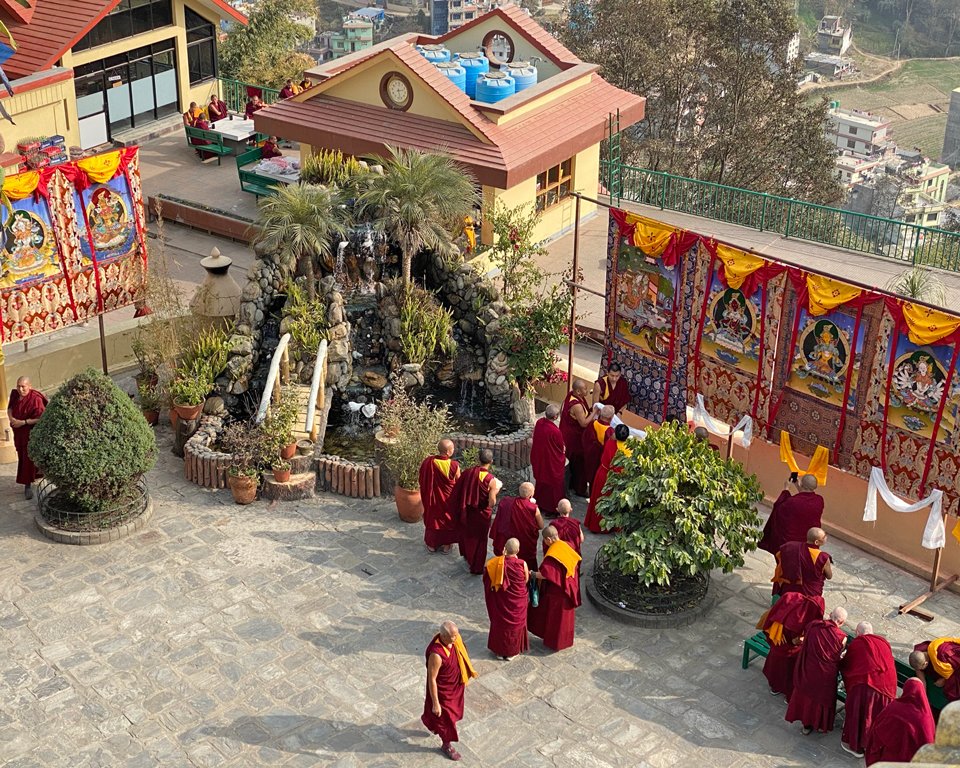
Lama Zopa Rinpoche with Khadro-la, Khen Rinpoche Geshe Chonyi, Kopan Lama Gyupas, and Kopan nuns, during consecration of the large appliqué 21 Taras and 8 Taras That Save from Fear thangkas outside Kopan Monastery’s main gompa, Nepal, January 2021. Photo by Ven. Roger Kunsang.
In the following Essential Extract video, from a teaching Lama Zopa Rinpoche gave in December 2019 at Kopan Monastery, Rinpoche explains the wheel of life drawing and reminds us that death can happen at any time. In the drawing you can see that the whole wheel is in between fangs. During our whole life we are between the fangs of Yama. And they can close any time. Rinpoche recalls a couple of events where people have died suddenly and unexpectedly. He strongly encourages us to meditate on death and impermanence. Otherwise you live your live with the concept of permanence, thinking “I will live long,” while wasting time. When you lie in bed, think, “Now I am lying here in my bed, but tomorrow I can already be on the pile of firewood in the cremation ground.” When you think this, attachment and anger have no reason to exist, and the mind is at peace.
Watch the sixteen-minute video “Our Whole Life We Are in between the Fangs of Yama”:
https://youtu.be/8HvK38Cm0HE
Transcript: So, I mentioned that the dongka, this is fangs, like you are in the mouth of Yama, impermanence, nature of impermanence, under impermanence. So holding like this, but anytime can be like this, mouth can close. So anytime death can happen. You never know, never you know. By next time this year, you are somewhere else—you never know—hell or deva realm, you never know where, by this time next year, by this time tomorrow. We can’t say—can close the mouth, you are inside now, between the fangs, but it can close anytime. So that is a very good meditation—it can close anytime. (Rinpoche closes his fingers.) It can close anytime, so death can happen anytime. You never know.
Even recently, I think in America or somewhere, it might be in the house, [someone] just suddenly died, who, I forgot. (Pause) Pende’s mother. Father and mother [were] talking in the house. They were talking to each other, and father did like this (Rinpoche turns his head), during that time mother, dead. They were just talking, the father and mother. Father went this way, then mother dead. So it always happens that.
One student here, she wanted to become a nun so much, unbelievable, so much. Khadro-la would see, of course. She is young, I think didn’t inspire her to become nun. Of course, Khadro-la can see past, present, and future. She [the student] died here in the toilet. She died here in the bathroom. I forgot her name. I have a big buddha in my room, I told them to make for her purification, good rebirth. I was thinking that her father to keep the buddha in the house, but the father didn’t want, so I have it in my room. … (Rinpoche offers more examples, see complete transcript.)
Like that anytime it can happen. I think that is the most important meditation, that is my, well, I haven’t started Vajrasattva, but my last advice is that. To remember, to always remember mindfulness, to always remember impermanence-death, that is my last very important advice, very important advice. I think that was also said by the Buddha, I forget now, to his disciples. Oh, that.
Kadampa geshe Sharawa said, “Even you have one hundred qualities, but you are under one mistake.” (Tibetan) So many, so many degrees from university, all this, all that, so many, like that, wow—but then even Dharma, even Dharma, “Oh, I know this, I know Madhyamaka, I know Pramanavartika, I did this retreat, that retreat, bah, bah, bah, bah.” But if you haven’t thought of impermanence-death, then there is the concept of permanence, so your life is under the control of hallucination. So “even if you have a hundred qualities but you are under one mistake,” so learned in Dharma texts, so many things, but you never thought of impermanence-death, yourself, or yourself, so then always you live with a concept of permanence, “I will live very long, I will live long,” always the concept of permanence. Then your actions of body, speech, and mind don’t become Dharma. You are very learned in Dharma, yes, unbelievable, but you never think of impermanence, your life is impermanence-death, you never think, so “I’m going to live long,” then your actions of body, speech, and mind don’t become Dharma. So here, even you are expert in Dharma but you waste your life. You understand? So like that. Did that retreat, this retreat, bah, bah, bah, but never, your own life impermanence-death, you didn’t think, so always wrong concept of permanence.
That is what Kadampa geshe Sharawa said. Even living in the monastery, doing extensive study, understanding and can explain, but never thought of impermanence-death, so your actions, with the concept of permanence then your actions didn’t become Dharma. Then death happens, then you know you cheated yourself. That is what you come to know, totally. There are more words, but… As I said, as I told before, same thing, even you are not learned in Dharma, nothing, but a lot of degrees, a lot of education in science, this and that, so many things, but never thought your life is impermanent, then suddenly—but you always live in concept of permanence—then suddenly when death happens so regret, so upset, so regret, bah, bah, bah, because you didn’t expect it, bah, bah, bah.
If you normally meditate, or you normally think, mindful in your life of impermanence-death, if you practice mindfulness every day remember, the awareness in that, even when death comes suddenly, you are not surprised. You are not worried because you did preparation. You did preparation because of mindfulness of that, so you did already preparation. So future life, to achieve happiness, body of happy transmigratory being, liberation from samsara, then enlightenment, thinking of impermanence-death, so then you have no worry when time of death comes, the actual time of death comes. Even for business people it is easier, normally you think so therefore it is easier. But normally you don’t think, so then it is incredible fear, bah, bah, bah, can be anger, like the Japanese boy, sssssh, can be incredible fear. Then of course, then, next life reincarnation, bah, bah, bah, good rebirth, higher rebirth, negative karma, lower rebirth, sssssh, there is another one.
So here it says, it is a good body, the body is here now, body is in your bed, body is here, but by this time tomorrow the body can be on the firewood, burned, skull coming out. You see the skull. (Rinpoche snaps his fingers.) Just anytime this can happen. (Rinpoche snaps his fingers.) It is so good, so good even meditating that you are dying, now you are dying. The whole thing, what is going to happen, going to the cemetery, the body by this time tomorrow, cemetery and fire, next year or next month, next week, tomorrow, the body could be there. That is so good, good meditation, so good meditation, that, to meditate, to think that. It is the reality. (Rinpoche snaps his fingers multiple times.) Then attachment to this and that, anger to this, bah, bah, bah, then you have no, there is no purpose to get angry and to be attached. This and that, all the problems, there is no reason to arise anger and attachment. The mind has great peace, free from attachment, free from anger.
Watch more videos from Lama Zopa Rinpoche’s teaching from the 2019 Kopan Course, the annual month-long lamrim course at Kopan Monastery in Nepal:
https://fpmt.org/media/streaming/teachings-of-lama-zopa-rinpoche/kopan-2019/
Find more Lama Zopa Rinpoche Essential Extracts videos:
https://fpmt.org/media/streaming/essential-extracts/
During February 2021, Rinpoche is taking a break from offering his video series Teachings on Thought Transformation during the Time of COVID-19. You find links to the ninety published videos in this series as well as transcripts, MP3s, additional practice advice, and more:
https://fpmt.org/fpmt/announcements/resources-for-coronavirus-pandemic/advice-from-lama-zopa-rinpoche-for-coronavirus/
Lama Zopa Rinpoche is the spiritual director of the Foundation for the Preservation of Mahayana Tradition (FPMT), a Tibetan Buddhist organization dedicated to the transmission of the Mahayana Buddhist tradition and values worldwide through teaching, meditation and community service.
- Tagged: advice from lama zopa rinpoche, essential extract, essential extract thought transformation teachings, impermanence and death, video
29
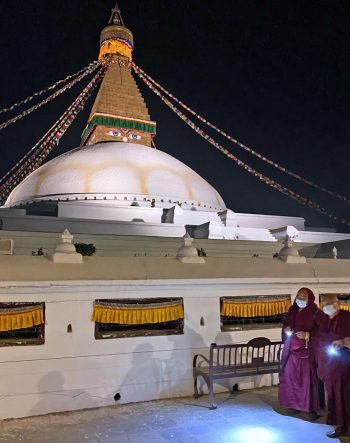
Lama Zopa Rinpoche circumambulating Boudha Stupa late at night, Nepal, January 2021. Photo by Ven. Roger Kunsang.
Patience: A Guide to Shantideva’s Sixth Chapter is a recent book of Lama Zopa Rinpoche’s teachings on the perfection of patience, a topic Rinpoche has taught on extensively. In this book, Rinpoche gives commentary on the verses on patience in Shantideva’s A Guide to the Bodhisattva’s Way of Life. Here’s an excerpt from the chapter “How to Accept Suffering”:
Shantideva next explained that whatever we do will become easier the more we practice it. This is very important advice. Whether something is easy or difficult depends on how acquainted we are with it. It all depends on training. Say we have been living with bugs for a long time: fleas, bedbugs, and so forth. This becomes normal for us. Fleas in our clothes, lice in our hair—they don’t bother us at all after a while. On the other hand, if we have never come across bugs before, if we are used to sleeping in a clean, soft bed and living a very luxurious lifestyle, to encounter bugs for the first time is a great shock. While there are fleas in our house we can’t do anything. We want them killed or we want to buy a new house!
Training the mind in patience can be done for worldly reasons or for the Dharma. I mentioned the people in India who cut and burn their bodies and fast for many days—something we cannot do. They can do this because they have trained their minds to accept that suffering, mistakenly thinking it is worthwhile. It all depends on how the mind—the colorless, shapeless, immaterial mind—interprets things. Something we find impossible to do can be done by somebody else easily. For a person who seeks worldly pleasure, practicing the Dharma is extremely difficult because their mind sees it as difficult. On the other hand, they will persevere for what they dearly want—possessions, reputation, and so forth—no matter how difficult, willingly undergoing hardships and danger.
For a Dharma practitioner it is completely the opposite. All the hard work needed to gain possessions, reputation, and so forth seems utterly pointless, but they willingly accept suffering to obtain the happiness of future lives, liberation from samsara, and enlightenment. Whereas the smallest samsaric thing is unbearable, they are happy to do the most difficult Dharma work.
Shantideva said we should not be impatient with things such as heat, cold, insect bites, and so forth, because if we are, then we will become increasingly intolerant of them. Conversely, we need to slowly build up our acceptance of small sufferings so we can start to accept greater ones.
Things that irritate us now, such as bad weather, can be the beginning of our training, learning to accept them for the sake of other sentient beings because we see the importance of developing patience on our road to enlightenment. Gradually, once we train our mind in these small sufferings, we can learn to become like the Buddha when he was a bodhisattva and give our body to a starving tiger.
Therefore it is greatly worthwhile to train the mind in patience in this way. If we live in a place that is full of snakes, mosquitoes, fleas, and bedbugs, it is like living in a palace full of jewels.
Excerpted from Patience: A Guide to Shantideva’s Sixth Chapter by Lama Zopa Rinpoche, edited by Gordon McDougall, published by Wisdom Publications:
https://shop.fpmt.org/Patience–A-Guide-to-Shantidevas-Sixth-Chapter-eBook_p_3366.html
Watch the video series “Lama Zopa Rinpoche’s Teachings on Thought Transformation during the Time of COVID-19” and find links to videos in translation, transcripts, MP3s, additional practice advice, and more:
https://fpmt.org/fpmt/announcements/resources-for-coronavirus-pandemic/advice-from-lama-zopa-rinpoche-for-coronavirus/
Lama Zopa Rinpoche is the spiritual director of the Foundation for the Preservation of Mahayana Tradition (FPMT), a Tibetan Buddhist organization dedicated to the transmission of the Mahayana Buddhist tradition and values worldwide through teaching, meditation and community service.
21
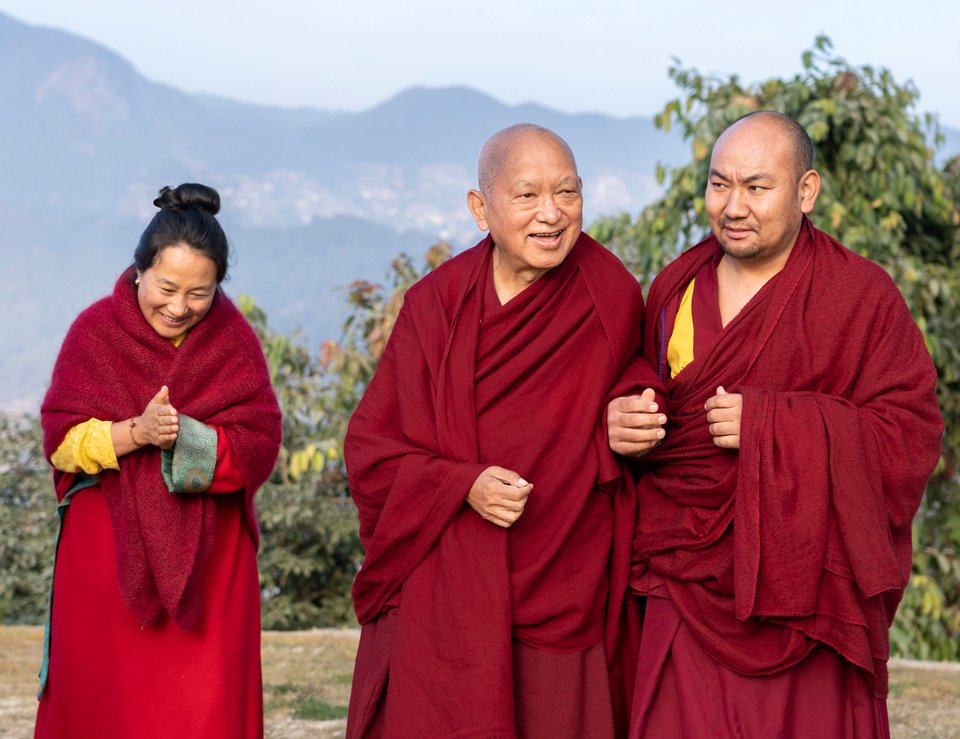
Khadro-la, Lama Zopa Rinpoche, and Ven. Thubten Tendar, Kopan Monastery, December 2020. Photo by Ven. Lobsang Sherab.
Patience: A Guide to Shantideva’s Sixth Chapter is a new book of Lama Zopa Rinpoche’s teachings on the perfection of patience, a topic Rinpoche has taught on extensively. (Perhaps this is not surprising since Rinpoche’s name “Zopa” means “patience.”) In this book, Rinpoche gives commentary on the verses on patience from Shantideva’s A Guide to the Bodhisattva’s Way of Life. Here’s an excerpt from the chapter “Overcoming the Wish to Retaliate” where Rinpoche discusses the conventional reason anger is inappropriate:
Ultimately, the enemy who gives harm and the harm itself are both empty. Neither exists inherently in any way. Because we are unable to see it like this, we should train to see things as like illusions, like dreams—maybe like hallucinations that happen when we take LSD! Because everything is dependent on other factors and nothing governs itself, these illusion-like phenomena are nothing to get angry about. It is like in our dreams there might be an enemy, but when we awaken we realize there is no enemy there, existing by its own nature.
The enemy is like a dream enemy, but that does not mean they are actually a dream, that is, nonexistent. When we are meditating on emptiness, we must be so skillful not to fall into nihilism. In his Four Hundred Stanzas, Aryadeva said that believing that nothing exists—including the I and karma—and hence falling into nihilism creates karma heavier than having killed a hundred million people.
If the emptiness of the I meant there were no I at all, either truly existing or merely labeled, then nothing would exist. No suffering would exist; no pleasure would exist. There would be no need to move the body, no need to breathe. Everything would be completely pointless. Everything we do is to attain happiness and stop suffering, but if there were no I at all, none of our actions would have any effect. With no I, why have expensive treatments in hospital to cure the I that doesn’t exist?
Many mistakes arise when we mistakenly think that the I doesn’t exist at all. We meditate to try to attain a peaceful, happy mind, but this I cannot receive any peace because it doesn’t exist. There is no karma, no cause, and no effect. There is no point to anything and no reason to refrain from creating negative actions.
To think that because there is no I, no enemy, no phenomenon, and therefore nothing matters, we deny karma. That is a completely dark mind; it is very dangerous. Emptiness is not nothingness; meditating on emptiness is not watching nothing, like sitting in a helicopter looking at blank sky.
Nothing exists ultimately, but because everything is a dependent arising, everything exists conventionally, existing in dependence on causes and conditions. The enemy, the anger they have, the harm they give us, all arise due to causes and conditions. The suffering we feel from that person’s anger has arisen due to karma, the negative actions we have done in the past, therefore we should not become angry in return.
For instance, it might seem that being criticized is a cause of anger, but if it that were so, then anybody who ever received criticism would have to get angry. That is not so. Somebody could criticize a buddha or a bodhisattva and no anger would arise at all. Even many ordinary goodhearted people will not react to criticism and other harmful actions.
A higher bodhisattva, who has totally renounced the self and only cherishes others, has still to remove the subtle imprints to knowledge, but all the grosser disturbing-thought imprints have been destroyed, so it is impossible to become angry even if somebody tried to harm them. Anger is only a condition; it is not an inherent cause. And because the cause is our own delusion, there is no reason to be angry at the person who has harmed us.
Excerpted from Patience: A Guide to Shantideva’s Sixth Chapter by Lama Zopa Rinpoche, edited by Gordon McDougall, published by Wisdom Publications (WisdomExperience.org).
Watch the video series “Lama Zopa Rinpoche’s Teachings on Thought Transformation during the Time of COVID-19” and find links to videos in translation, transcripts, MP3s, additional practice advice, and more:
https://fpmt.org/fpmt/announcements/resources-for-coronavirus-pandemic/advice-from-lama-zopa-rinpoche-for-coronavirus/
Lama Zopa Rinpoche is the spiritual director of the Foundation for the Preservation of Mahayana Tradition (FPMT), a Tibetan Buddhist organization dedicated to the transmission of the Mahayana Buddhist tradition and values worldwide through teaching, meditation and community service.
14
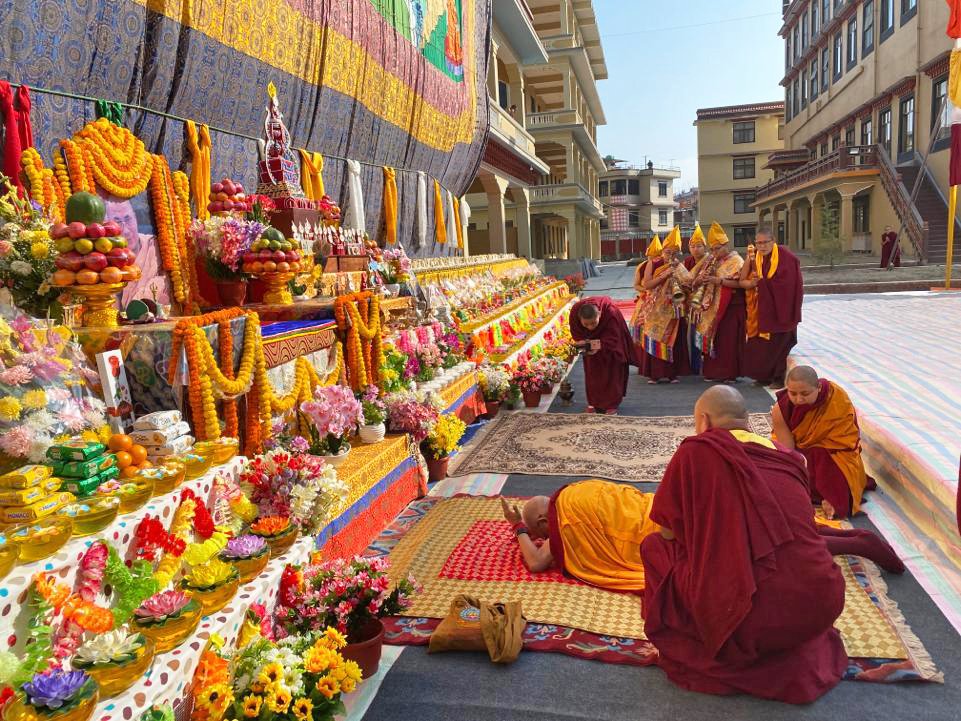
Lama Zopa Rinpoche prostrating to the giant Guru Rinpoche thangka during the Guru bumtsok at Khachoe Ghakyil Nunnery, January 2020
Lama Zopa Rinpoche explains that the solution to our problems is to do purification practice every day. These practices include reciting the names of the Thirty-Five Buddhas while prostrating to them, reciting powerful mantras such as Buddha Shakyamuni’s name mantra, doing self-initiation, and reciting OṂ MAṆI PADME HŪṂ, which purifies not only ourselves but even the microscopic creatures living in our bodies.
In the following short excerpt from Rinpoche’s video teachings on thought transformation, Rinpoche emphasizes that if we know these practices, we should do them now because we can die anytime!
Watch the eight-minute video “Purify Now Because You Can Die Anytime!”:
https://youtu.be/KNcFuxuCcpo
Here is the transcript of Rinpoche’s teaching in this video:
The Solution to Suffering Is to Do Purification Every Day
So therefore, you can see now that purification is so important. The solution is purification every day. Practice as much as possible purification. We are soooooooo most unbelievably, most unbelievably fortunate.
1. Purify by Reciting the Thirty-Five Buddhas’ Names
There are many different buddhas’ names to purify different negative karmas. There are many different mantras that are so powerful, not only Vajrasattva. But the Thirty-Five Buddhas are so powerful. Bah, bah, bah. By reciting [their names] one time, by practicing well the Thirty-Five Buddhas, it purifies the tsham me nga, the very heavy five heavy negative karmas without break: killed father or mother or an arhat, harmed a buddha, [caused] disunity among the sangha. So, that means there is no question about the ten nonvirtuous actions collected in this life and past lives. Then no question. Even the very heavy negative karmas without break, the five, the five heavy negative karmas, even them, they get completely purified, bah, bah, bah, those collected in this life and past lives. Ssssh. Wow, wow, wow.
That’s why Lama Tsongkhapa did so many hundreds of thousands of prostrations by reciting the Thirty-Five Buddhas. He did so many, so much, not just seven hundred thousand, but so many. That’s why in Lama Tsongkhapa’s teachings, the Gelugpa lamas, the lineage lamas, every day they did much prostrations, so many prostrations. I think one lama, I don’t remember the name, Buton Jampa Rinpoche or some lamas do a thousand prostrations a day. Then, many do a hundred prostrations by reciting the Thirty-Five Buddhas. Ssssh.
2. Purify by Reciting the Powerful Mantras
Then there are many mantras, ssssh, very powerful. Even by reciting Buddha’s name mantra:
Buddha Shakyamuni’s Name:
[LA MA] TÖN PA CHOM DÄN DÄ DE ZHIN SHEG PA DRA CHOM PA YANG DAG PAR DZOG PÄI SANG GYÄ PÄL GYÄL WA SHA KYA THUB PA LA CHHAG TSHÄL LO
To [Guru,] Founder, Bhagavan, Tathagata, Arhat, Perfectly Completed Buddha, Glorious Conqueror, Shakyamuni, I prostrate.
Buddha Shakyamuni’s Mantra:
TADYATHA OṂ MUNE MUNE MAHĀ MUNAYE SVĀHĀ
It is said in Kangyur, the Buddha’s teachings, it purifies, by reciting it one time it purifies a billion, 80,000 billion eons of negative karma. Eighty, 80,000 billion eons of negative karma by reciting one time Buddha’s name mantra. You should know that. Everybody should know that. So, take the opportunity, rather than leaving it in the sky! That doesn’t help. You have to practice! Do what you come to know! Practice Dharma! Aaaah. These are incredible methods of sutra and tantra. Bah, bah, bah. Yeah.
3. Purify by Doing Self-Initiation
And those who received a highest tantra initiation, yes, then there is dag jug, self-initiation. You take the initiation yourself. There is a long one, elaborate, middle one, and short one according to your time. It is so good if you break the bodhisattva vow or tantric vow. If you break the pratimoksha, bodhisattva, or tantric vow and general negative karma, it all gets purified. His Holiness does every day Yamantaka self-initiation. His Holiness does it every day. No matter how much busy he is, he does it every morning before he comes out. So, like that, if even His Holiness does it, of course, there is no question that we have to do it.
So, this is the answer of what to do! You have to know this—what to do! Aaaah. Then, yeah, do purification. Aaaah. Purify all the negative karmas you have collected from beginningless rebirths! Beginningless rebirths! Yeah, not just today, not just this life. No. Many people just do this life, maybe. Even that is good but …
4. Purify by Reciting OṂ MAṆI PADME HŪṂ
Then by reciting OṂ MAṆI PADME HŪṂ, wow, wow, wow, that purifies unbelievable, most unbelievable. Purifying yourself, being Chenrezig purifies yourself. Then together are all the simbu nyetri, the twenty-one thousand creatures inside your body living, it is said in a text. So, they all get purified at the same time. So, for example, when you go around a holy object, also they get purified. They get the cause of enlightenment. We carry animals and then we go around for them to achieve enlightenment. The same thing, all the creatures, the twenty-one thousand living inside your body, all those sentient beings get purified and they also create the cause of enlightenment, not only yourself, not only yourself alone. No. You have to know that. Bah, bah, bah.
Do These Purification Practices Now Because You Can Die Anytime!
So, mantras and those things, [reciting] the buddhas’ names, if you heard them, if you know them, don’t leave them just there. No. Practice! Do it now because you can die anytime! Aaaah. You can die anytime. Aaaah. You can die in the middle of the night and the next morning you become a corpse. So, like that, it is never sure, never. Whatever happens to others, it happens to you. So, you can die anytime, so therefore, you must practice now! Just leave it for later, keep it for later, you keep it but don’t practice, that is laziness. Tsk, tsk. Myself too does like that. Many mantras have so much power, so much benefits, but you leave them there. So, you don’t make your life beneficial. Ha-ha. It is like information you found in Skype or something. It is like that, then you leave it there. You didn’t use it. Ha-ha. Okay. All right!
You can find more resources and links on the FPMT Education pages Purification and Mantras.
Watch more from the video series Lama Zopa Rinpoche’s Teachings on Thought Transformation during the Time of COVID-19 and find links to videos in transcripts, MP3s, additional practice advice, and more:
https://fpmt.org/fpmt/announcements/resources-for-coronavirus-pandemic/advice-from-lama-zopa-rinpoche-for-coronavirus/
Lama Zopa Rinpoche is the spiritual director of the Foundation for the Preservation of Mahayana Tradition (FPMT), a Tibetan Buddhist organization dedicated to the transmission of the Mahayana Buddhist tradition and values worldwide through teaching, meditation and community service.
- Tagged: 35 confession buddhas, advice from lama zopa rinpoche, essential extract, essential extract thought transformation teachings, mani mantra, purification, purification practice
11
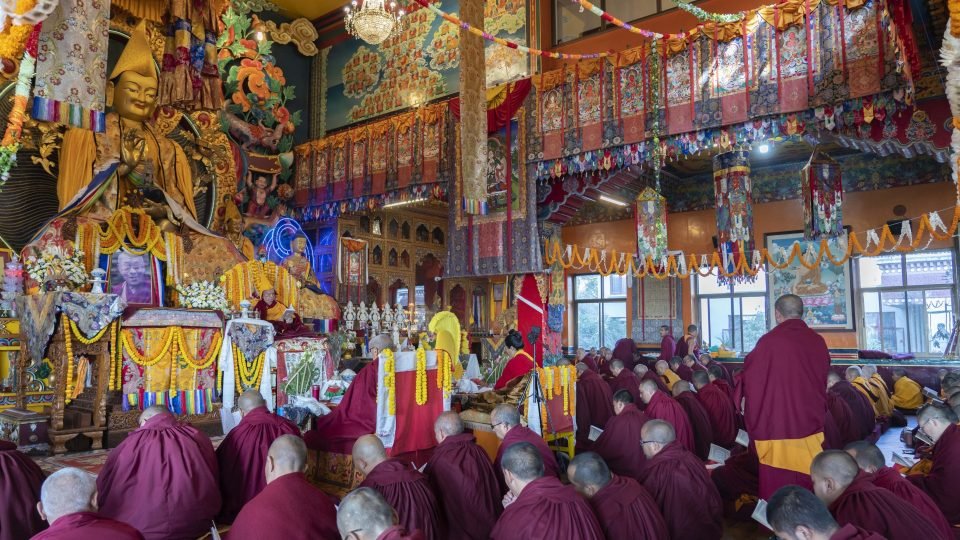
Long life puja offered to Lama Zopa Rinpoche at Kopan Monastery, December 25, 2020. Photo by Ven. Lobsang Sherab.
On December 25, 2020 a White Tara Long Life Puja was offered to Lama Zopa Rinpoche on behalf of all FPMT centers, projects, services, and students. For seven days leading up to this puja Rangjung Neljorma Khadro Namsel Drönme (Khadro-la), Khen Rinpoche Geshe Chonyi, thirty-five senior monks, and fifteen senior nuns completed many hours of preparation practices at Kopan Monastery in order to make the long life puja as powerful as possible. There were two sessions of White Tara practice a day during which the forty-five to fifty individuals in attendance recited many White Tara and Tara mantras to eliminate obstacles to Rinpoche’s long life. They also recited a special mantra that combines the White Tara mantra with Lama Zopa Rinpoche’s name mantra:
OM TARE TUTTARE TURE OM AH GURU VAJRADHARA MUNI SHASANA KSHANTI SARVA SIDDHI AYUR PUNYE JNANA PUSHTIM KURU SVAHA
For the actual puja, the Kopan gompa was decorated with victory banners, long hanging banners, and smaller triangular banners, along with garlands of flowers hanging between the pillars. The thrones of His Holiness and Rinpoche were covered in garlands of marigolds. Before the puja, the Kopan monks and about fifty to sixty of the older nuns from the nunnery attended and participated in White Tara practice that had been done all week. This was followed by the actual long life puja, during which many offerings were visualized and offered to the guru in the form of White Tara.
Request to the Dakinis was offered, which is part of the usual long life puja when done together with Lama Chopa. During the Request to the Dakinis, Rinpoche was offered the traditional long life offerings of a double vajra, monk’s robes, pandit’s hat, monk’s seat cover, begging bowl, monk’s staff, seven precious royal objects, and eight auspicious signs. He was also offered some very beautiful statues of White Tara, Namgyalma, and Amitayus. Those in attendance also offered part of the short Sixteen Arhats Puja and the Prayer to Amitayus in addition to the various long life prayers and requesting and thanking mandalas.
Ven. Joan Nicell, who was in attendance said, “The whole event was beautiful and went smoothly. Rinpoche seemed very happy with the puja. From my side, it was one of the most special ways to celebrate Christmas that I have experienced since becoming a Buddhist.”
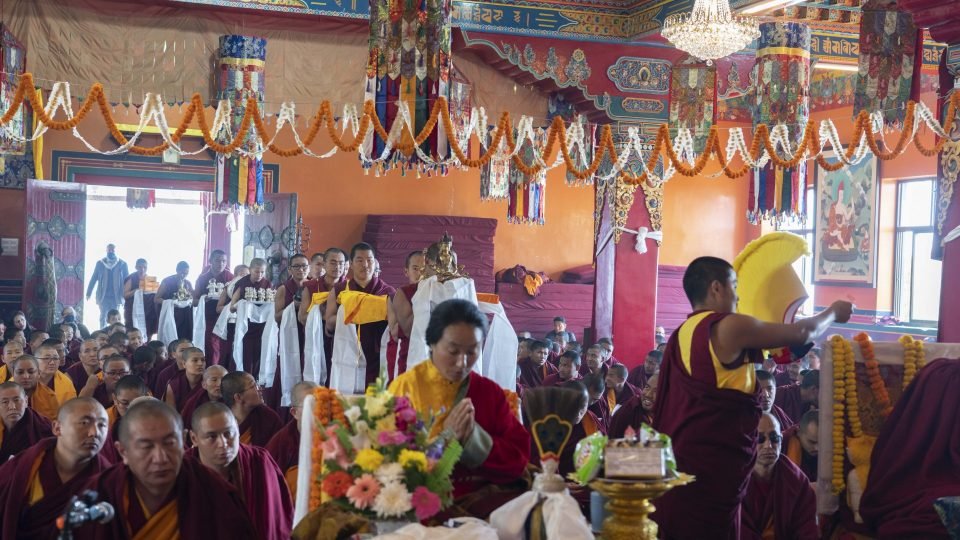
Long life puja for Lama Zopa Rinpoche. led by Khadro-la, Kopan Monastery, December 25, 2020. Photo by Ven. Lobsang Sherab.
Please enjoy this short video of highlights from this most auspicious event:
https://youtu.be/-juSPvEPU3g
Another upcoming long life puja will be offered to Lama Zopa Rinpoche during the third Tibetan month (actual date still to be determined). This will be an Amitayus Long Life Puja and will also be preceded by seven days of preparation practices at Kopan Monastery, led by Khadro-la.
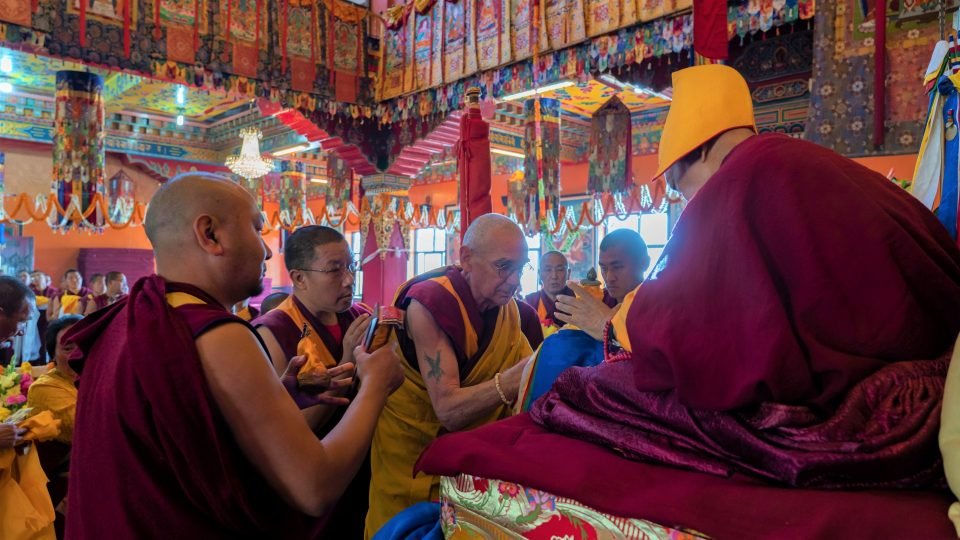
Ven. Roger Kunsang offering body, speech, and mind mandala to Lama Zopa Rinpoche during the long life puja held at Kopan Monastery, December 25, 2020. Photo by Ven. Lobsang Sherab.
All are welcome to participate in this upcoming puja by offering prayers from your heart on the day of the puja or offering any amount towards the puja. We also invite you to rejoice in the completion of the December 25 long life puja, with strong prayers of dedication for Lama Zopa Rinpoche’s long life.
The Long Life Puja Fund always contributes to long life pujas offered to Lama Zopa Rinpoche. You can also learn about the many Charitable Projects of FPMT and discover the many ways the various funds and projects are benefiting others.
- Tagged: lama zopa rinpoche long life puja fund, long life puja, long life puja for lama zopa rinpoche
7
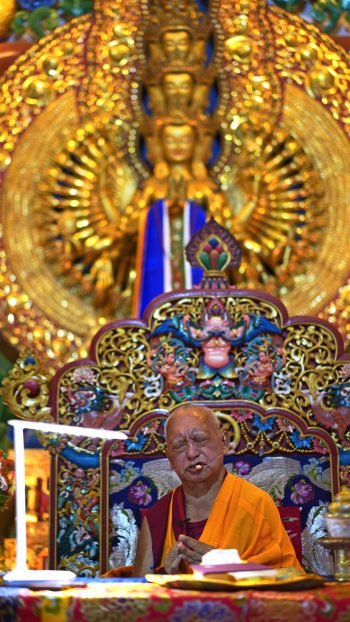
Lama Zopa Rinpoche teaching at Khachoe Ghakyil Nunnery, Nepal, October 2020. Photo by Ven. Lobsang Sherab.
For many years, Lama Zopa Rinpoche has called on students around the world to recite the Sutra of Golden Light for world peace. “For anyone who desires peace for themselves and for others this is a powerful way to bring peace that doesn’t require you to harm others, doesn’t require you to criticize others, or even to demonstrate against others. Anyone can read this text, Buddhists and even non-Buddhists who desire world peace,” Rinpoche says in “Recite the Golden Light Sutra for World Peace.”
In a letter to a European MP, Rinpoche wrote about the importance of spiritual power to help difficult situations in countries. Rinpoche says that praying, for example, is such a simple thing that can make things better. Rinpoche also recommended reciting the Sutra of Golden Light.
“For instance, the precious teaching of the Buddha called the Golden Light Sutra could be read in Iraq month after month (not just once). That text has the power to bring world peace and also becomes a healing practice for all the sick people in the city where it is read,” Rinpoche wrote.
“By reading this sutra your life only gets better and better, only goes up, never down, right up to enlightenment. Reading it becomes an incredible protection for the country where it is read and gives incredible power to its king or president. It also enables you to defeat a country’s enemy by making them lose power and unable to attack the country and its leader. If you read this text with mindfulness, you will see there is so much there. It can also help against terrorist attacks—this is all through the spiritual power of the Buddha’s holy words. It fulfills the wishes for happiness of everybody who reads it, now and forever. Their problems are taken care of naturally, with the help of so many devas and protectors who are around to help. This is just what I think and I am expressing it to you, that is all.”
You can find links to the sutra text as well as video of Rinpoche offering the sutra as an oral transmission on FPMT.org’s “Sutra of Golden Light” page. This resource page also has more on the benefits of reciting the sutra and links for reporting sutra recitations and stories from students who have seen the benefits of reciting the sutra:
https://fpmt.org/education/prayers-and-practice-materials/sutras/golden-light-sutra/
To see more advice offered by Rinpoche to politicians, visit “Lama Zopa Rinpoche’s Online Advice Book”:
https://lamayeshe.com/advice/advice-politicians
Watch the video series Lama Zopa Rinpoche’s Teachings on Thought Transformation during the Time of COVID-19 and find links to videos in transcripts, MP3s, additional practice advice, and more:
https://fpmt.org/fpmt/announcements/resources-for-coronavirus-pandemic/advice-from-lama-zopa-rinpoche-for-coronavirus/
Lama Zopa Rinpoche is the spiritual director of the Foundation for the Preservation of Mahayana Tradition (FPMT), a Tibetan Buddhist organization dedicated to the transmission of the Mahayana Buddhist tradition and values worldwide through teaching, meditation and community service.
- Tagged: golden light sutra, politics, sutra of golden light
6
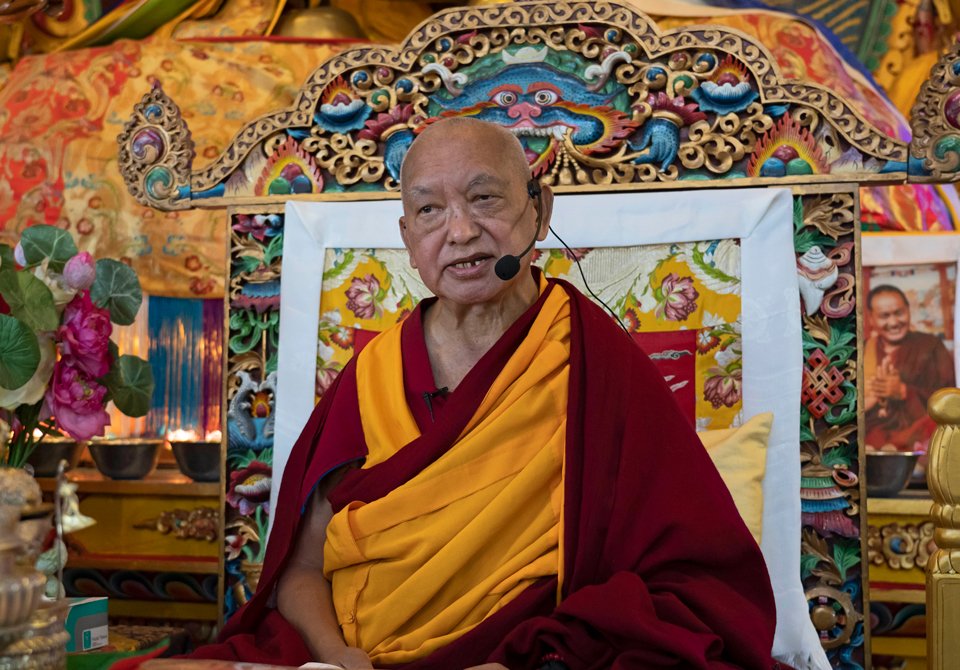
Lama Zopa Rinpoche offering a teaching to monks during puja on Lama Tsongkhapa Day, Kopan Monastery, Nepal, December 2020. Photo by Ven. Lobsang Sherab.
Lama Zopa Rinpoche hand wrote a card with extensive advice for a young student in January 2011. The following advice was extracted from Rinpoche’s card.
Here I want to say something. It’s very, very important to learn to benefit and not harm your parents, but to help them and make them happy. There are three types of karma. With one type you create the karma in this life and see the result in this life. Even helping in a small way is virtuous; it is powerful and therefore you see the result, happiness, in this life. However, it doesn’t necessarily mean only that. In future lives you will experience the results of one good act to your parents, such as praising them, saying nice things. If you harm them or get angry with them, even a small negative action such as criticizing them results in suffering in this life when you are older, not happiness. You can experience suffering in hundreds, thousands, of lifetimes, from that one act of disrespect.
The other type of karma is created in this life and experienced in the next life. Then there is the karma created in this life and experienced after billions, trillions, of eons. Even a small karma doesn’t get lost if it doesn’t meet opposite conditions. The happiness or suffering will be experienced even after eons.
All living beings experience different kinds of lives: success or failure, being educated, becoming a fool or a beggar, being forgetful or wise. Life can change with all kinds of experiences. It doesn’t stay one way all the time. Then it can also change from this life to the next life—being reborn as a hell being, a hungry ghost, a human being, an animal, a sura or asura, having all kinds of lives. These are real facts and the omniscient one, Guru Shakyamuni Buddha, has explained this. Everything can be checked; it’s not blind faith, it’s not just telling people what to believe.
Every single comfort and service you give to your parents is an unbelievably precious cause of success for yourself in this life and future lives. Buddha has shown the correct life that leads from happiness to happiness to enlightenment. Otherwise, life is totally lost and ignorant, like the moths that fly into candle flames and are burnt. Once the suffering or happiness resulting from an action is being experienced, it’s difficult to stop it at that time.
If suffering comes and you don’t know how it happened, the mind freaks out and suffers so much. By knowing about karma, the cause of that suffering, the mind has unbelievable peace. You should understand that negative karma can be purified, that actions done in the past can be purified. If you learn from Buddhism and have wisdom knowing what is right and wrong—the inner science—it will become more and more clear by checking. It’s different from other religions. The more wisdom you have, then no one can cheat you and there is a direction in life for you to follow. Buddha showed how to check and put this into practice for happiness and success. Buddha showed how to develop happiness in life, so that all your wishes get fulfilled and you fulfill others’ needs through Dharma.
Getting angry is one thing that destroys good karma, the cause of happiness, collected from beginningless rebirth. Hundreds or thousands of eons of merit get destroyed by even one second of anger arising toward someone whose mind is at a higher level than yours. If you are not a bodhisattva, getting angry with a bodhisattva for one second destroys hundred of eons of merits. Getting angry with a buddha destroys unbelievably much more. Unbelievable, unbelievable, unbelievable, unbelievable eons of good karma get destroyed. The most powerful one is the guru, thus anger toward the guru is the worst kind. Practicing patience brings so much peace and happiness from life to life.
By practicing patience and not getting angry, all your merits are protected and you don’t create the cause to be born in the lower realms. One second of anger destroys realizations for hundreds or thousands of eons. So you should live without anger and have a peaceful mind. If there’s only anger, it’s better to not communicate. That helps. Instead of saying something with anger, don’t talk. All actions done with delusion are suffering.
I love you, therefore I am giving you this advice.
This advice “The Wisdom of Dharma” was originally published in “Lama Zopa Rinpoche’s Online Advice Book” on the Lama Yeshe Wisdom Archive website:
https://lamayeshe.com/advice/wisdom-dharma
Watch the video series Lama Zopa Rinpoche’s Teachings on Thought Transformation during the Time of COVID-19 and find links to videos in transcripts, MP3s, additional practice advice, and more:
https://fpmt.org/fpmt/announcements/resources-for-coronavirus-pandemic/advice-from-lama-zopa-rinpoche-for-coronavirus/
Lama Zopa Rinpoche is the spiritual director of the Foundation for the Preservation of Mahayana Tradition (FPMT), a Tibetan Buddhist organization dedicated to the transmission of the Mahayana Buddhist tradition and values worldwide through teaching, meditation and community service.
- Tagged: advice from lama zopa rinpoche, karma
31
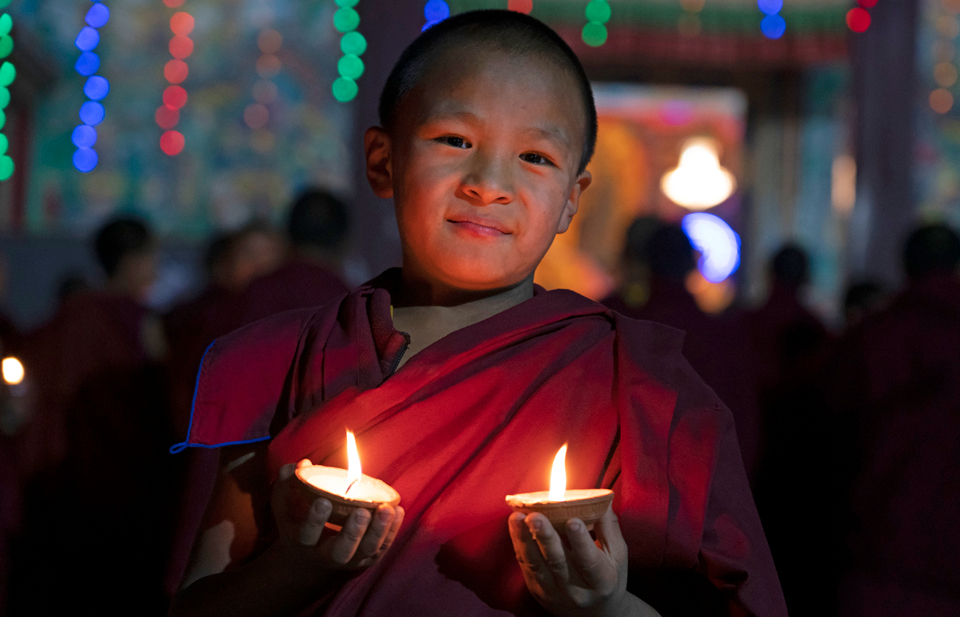
A young Kopan monk making light offerings on Lama Tsongkhapa Day, Kopan Monastery, Nepal, December 2020. Photo by Ven. Lobsang Sherab.
“Of course by purifying negative karma collected since beginningless rebirth and by collecting extensive merits, this allows you to have realizations on the path to enlightenment and for your mind to change,” Lama Zopa Rinpoche wrote to a student who offered 100,000 Vajrasattva mantras to Rinpoche. “There is always hope the mind can change, even to achieve enlightenment, so you can achieve a higher rebirth, ultimate happiness, liberation from samsara and enlightenment.”
“Vajrasattva practice is so important generally, and especially nowadays in the world, when there is not only global warming, but many other problems. There are so many other dangers—of war and sicknesses, cancer, and so many people whom you know are dying. There are so many sicknesses and other conditions for dying.”
“This Vajrasattva practice and other purification practices are the ultimate answer, so everything in the world—what you see, every situation—tells you to practice Vajrasattva. To purify and do Vajrasattva practice is the ultimate answer, to stop the cause to be reborn in the lower realms and the immediate [result] is to have a higher rebirth, to make preparation for death and then to meet the Dharma, to meet the virtuous friend who reveals the path to enlightenment. Then to achieve ultimate happiness, to be free from samsara and to achieve enlightenment for the numberless sentient beings and to free them from the oceans of samsaric sufferings and bring them to full enlightenment.”
From “Benefits of Vajrasattva Practice,” posted in Lama Zopa Rinpoche’s Online Advice Book:
https://lamayeshe.com/advice/benefits-vajrasattva-practice
You can find resources to support your Vajrasattva practice and other purification practices on the new Practices for Purification page:
https://fpmt.org/education/prayers-and-practice-materials/purification/
Watch the video series Lama Zopa Rinpoche’s Teachings on Thought Transformation during the Time of COVID-19 and find links to videos in transcripts, MP3s, additional practice advice, and more:
https://fpmt.org/fpmt/announcements/resources-for-coronavirus-pandemic/advice-from-lama-zopa-rinpoche-for-coronavirus/
- Tagged: purification, purification practice, vajrasattva
30
Lama Zopa Rinpoche’s Plushy Dharma Friends!
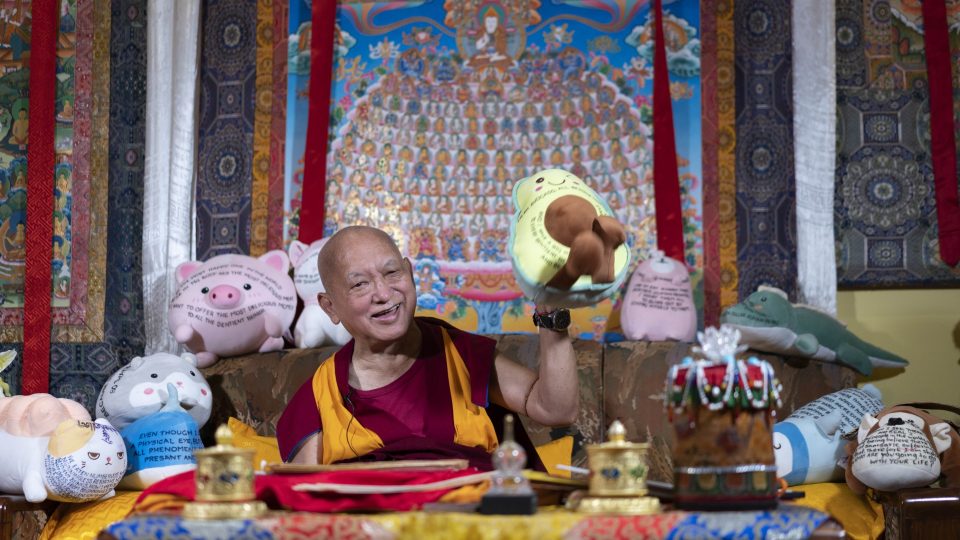
Lama Zopa Rinpoche with many of his stuffed Dharma animal friends, Kopan Monastery, Nepal, November 2020. Photo by Ven. Lobsang Sherab.
During Lama Zopa Rinpoche’s Teachings on Thought Transformation during the Time of COVID-19, Rinpoche has brought many “friends” to the teachings. More than twenty-five stuffed animals with profound words of wisdom written on their bodies have joined Rinpoche on the teaching couch at various times, and Rinpoche has delighted in sharing their messages with us. Rinpoche also introduced many of them at his birthday celebration at Kopan Monastery.
Watch Lama Zopa Rinpoche Introduce Dharma Stuffed Animal ‘Friends’ at Birthday Celebration:
https://youtu.be/FMaxgbPKxjU
Messages on Stuffed, Plush Dharma Toys
At Rinpoche’s request, we’ve collected the messages, which were composed by Rinpoche, and written on the stuffed, plush animals and toys. Rinpoche wanted these messages from his stuffed Dharma friends shared with students. We’re including some photos of these friends, too, which you are welcome to share.
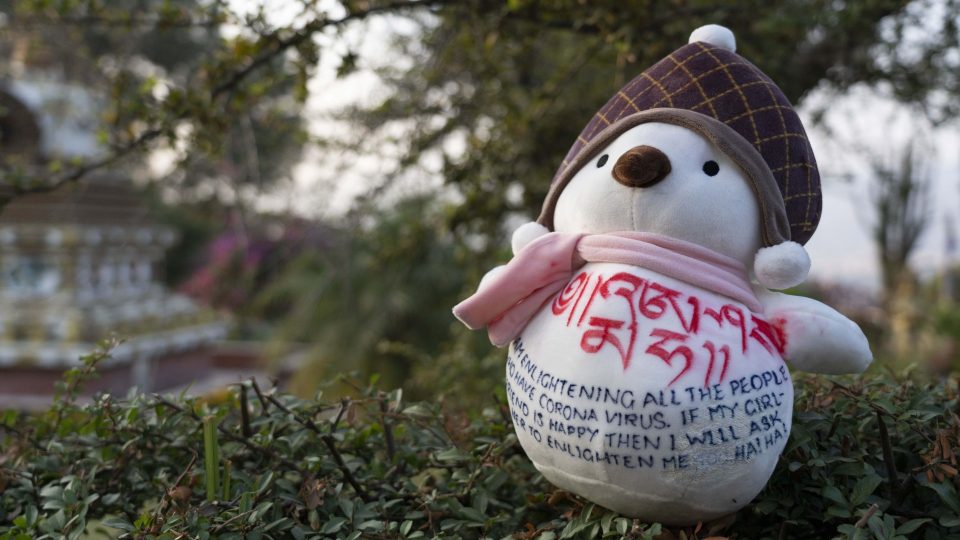
Brown hat girl with Dharma message, Kopan Monastery, Nepal, November 2020. Photo by Ven. Lobsang Sherab.
Brown hat girl: I am enlightening all the people with coronavirus. If my girlfriend is happy then I will ask her to enlighten me. Ha! Ha! Ha!
White bear: Everybody loves from the heart but I try to love from the brain or from the tip of my nose. Ha! Ha! Ha! He! He! He!
Cat: I’m the happiest person in the world because I know how to achieve satisfaction by renouncing the painful mind of desire.
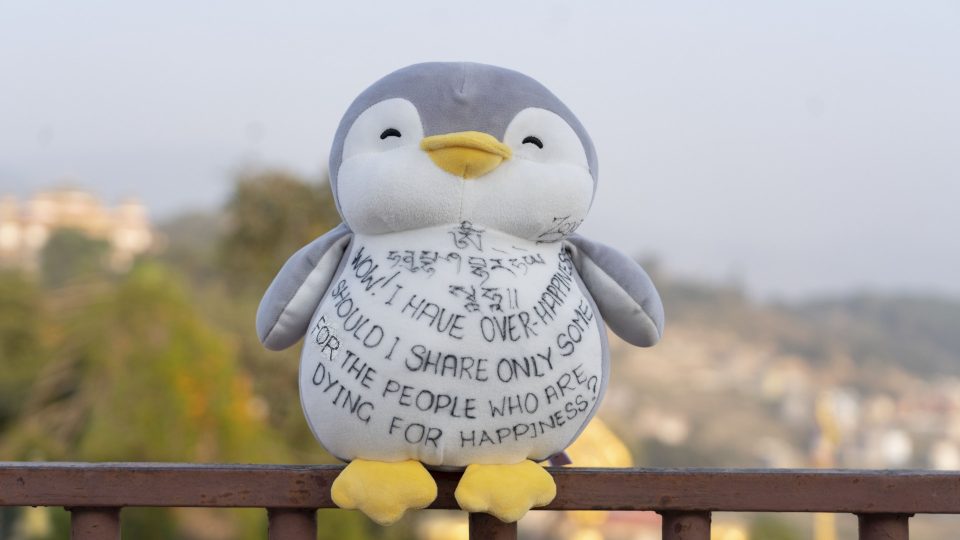
Penguin with Dharma message, Kopan Monastery, Nepal, November 2020. Photo by Ven. Lobsang Sherab.
Penguin: Wow! I have over-happiness. Should I share only some with the people who are dying for happiness?
Cat: I have the greatest satisfaction in the world … and do you want some?
Cat: Because sentient beings don’t love me, so that’s why I love them most.
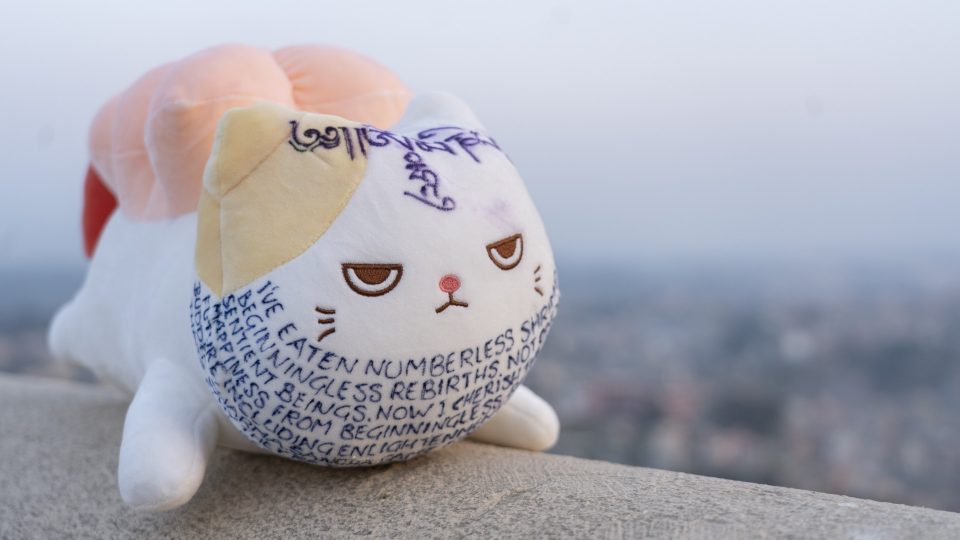
“Shrimp Cat” with Dharma message, Kopan Monastery, Nepal, November 2020. Photo by Ven. Lobsang Sherab.
Shrimp cat: I’ve eaten numberless shrimp from beginningless rebirths. Not only that, all sentient beings. Now I cherish them most because happiness from beginningless rebirths, now, even in future, including enlightenment, is received from them. Buddha, Dharma, Sangha came from their kindness. That’s why they’re the most precious, kind. I’ve taken full responsibility to enlighten them.
Crocodile: I have eaten all sentient beings numberless times from beginningless rebirths. So now I’ve completely dedicated my body, speech, and mind to every most kind, most precious sentient being. So this makes me so happy now.
Dolphin: The world people are suffering so much with self-cherishing mind and the root of samsara—ignorance, the three poisonous minds and so forth, full of hallucination with all the wrong concepts. I don’t have those things because I found the right path which purifies that. I have the most incredible peace and I don’t harm anybody. I feel a little bit shy because I have too much happiness, more than others. I stay quiet myself.
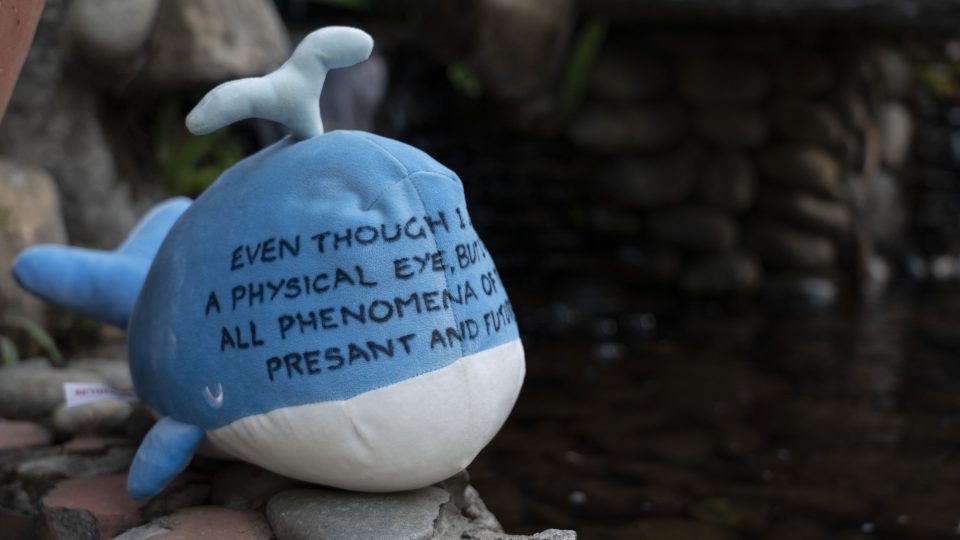
Whale with Dharma message, Kopan Monastery, Nepal, November 2020. Photo by Ven. Lobsang Sherab.
Whale: Even though I don’t have a physical eye, I can see all phenomena of the past, present, and future directly!
Buffalo: Now I see there is no real I. Educated people in the world and six-realm sentient beings believe there is real I. Oceans of samsaric suffering arises from that. Therefore I am shocked. Now, what are you going to do with your life?
Panda: Do you know who is you?
Bear: There is not one sentient being whom I can’t love.
Kiwi: What is my name?
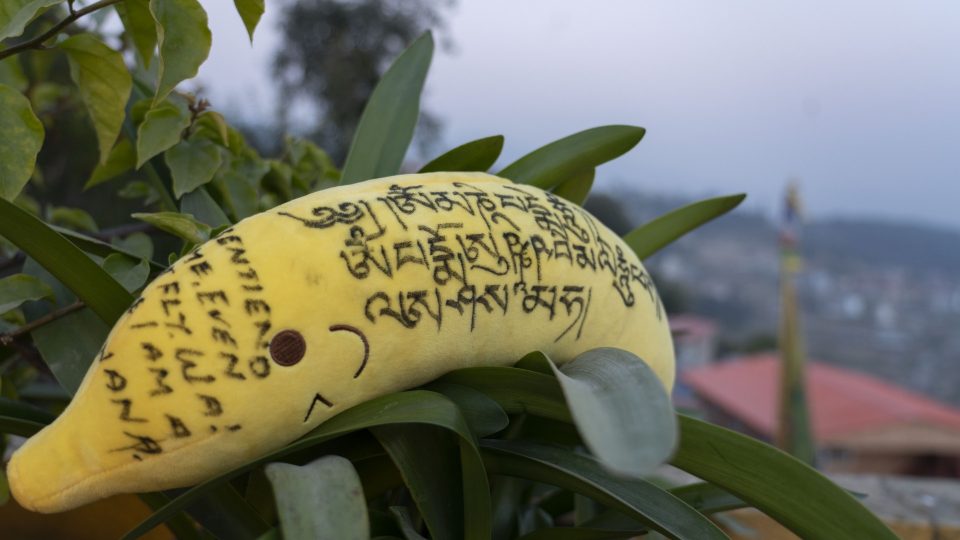
Banana with Dharma message, Kopan Monastery, Nepal, November 2020. Photo by Ven. Lobsang Sherab.
Banana: All the sentient beings love me, even the tiniest fly, wa! Because I am a banana.
Lizard: I am a lizard. I have the most satisfaction—more than a trillion-dollar human being.
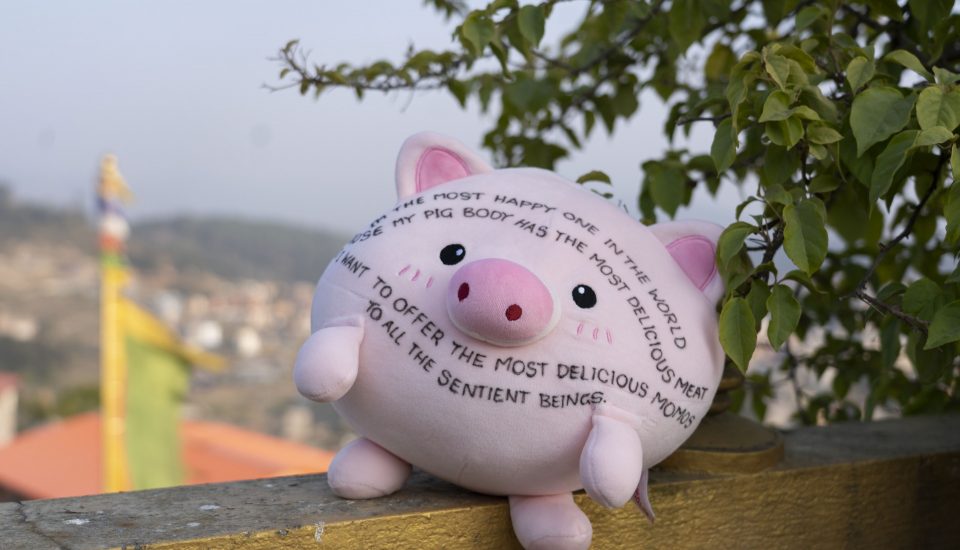
Pig with Dharma message, Kopan Monastery, Nepal, November 2020. Photo by Ven. Lobsang Sherab.
Pig: I’m the most happy one in the world because my pig body has the most delicious meat. I want to offer the most delicious momos to all the sentient beings.
Cat: I’m the most famous cat in the world. My name is OM AH HUM and I can cure all the viruses of every sentient being—but not diarrhea and farts!
Rabbit: I know so many animals like to eat rabbit, besides human beings. I want them all to blisss out by giving myself to them.
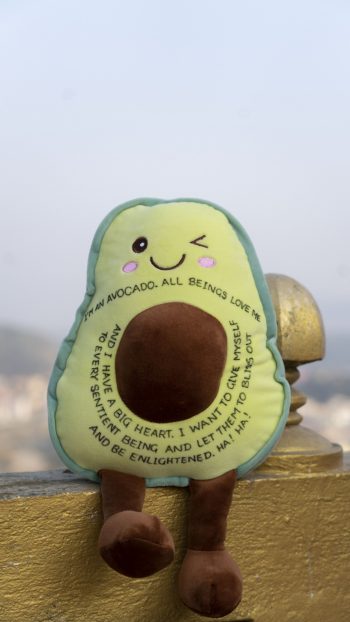
Avocado with Dharma message, Kopan Monastery, Nepal, November 2020. Photo by Ven. Lobsang Sherab.
Avocado: I’m an avocado. All beings love me and I have a big heart. I want to give myself to every sentient being and let them to bliss out and be enlightened! Ha! Ha!
Doll: I love all the sentient beings.
Bulldog: I am called a dog by human beings but I have a much better mind than most human beings. Ha! Ha! Ha! Ha! Ha!
Husky: I’m a dog from Canada. I eat everything except two-wing airplanes and four-leg tables. Ha! Ha!
Sloth: King, queen, president, or bug—don’t disturb me! I’m in deep meditation, just about to be enlightened for sentient beings. Ha! Ha! Ha!
Cat: I’m the most beautiful cat in the world, but people don’t love me. So I practice compassion for them. Ha! Ha!
Rabbit: I get angry but I try to practice patience. Ha! Ha! Ha! Ha! Ha!
Lama Zopa Rinpoche is the spiritual director of the Foundation for the Preservation of Mahayana Tradition (FPMT), a Tibetan Buddhist organization dedicated to the transmission of the Mahayana Buddhist tradition and values worldwide through teaching, meditation, and community service.
Watch the video series Lama Zopa Rinpoche’s Teachings on Thought Transformation during the Time of COVID-19 and find links to videos in transcripts, MP3s, additional practice advice, and more:
https://fpmt.org/fpmt/announcements/resources-for-coronavirus-pandemic/advice-from-lama-zopa-rinpoche-for-coronavirus/
- Tagged: dharma toys, lama zopa rinpoche, plushies, toys
29
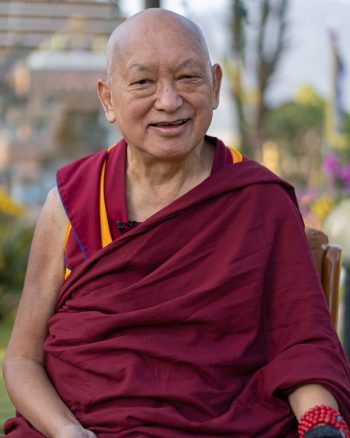
Lama Zopa Rinpoche at Kopan, Nepal, November 2020. Photo by Ven. Lobsang Sherab.
Lama Zopa Rinpoche continues his video teachings on thought transformation from Kopan Monastery in Nepal. Here is a summary of the most recent teaching:
Lama Zopa Rinpoche begins this teaching going over the first vital point of the four vital points of analysis as presented in Liberation in the Palm of Your Hand by Phabongkha Rinpoche. The first point of this analytical meditation on emptiness is recognizing the object to be refuted, the gag ja in Tibetan.
Phabongkha Rinpoche’s commentary offers a quote from Shantideva’s Bodhicharyavatara:
Without recognizing the thing that is imputed,
You cannot realize it’s non-existence.
Rinpoche then explains that it is like trying to hit a target with an arrow. Without seeing the target, you cannot aim the arrow at the target. In other words, you need to recognize exactly what is to be negated—what you are imputing as existing, but which doesn’t truly exist—in order to see that it doesn’t exist by its own nature, that it doesn’t exist from its own side.
The commentary continues saying that just hearing an explaination of the self to be negated isn’t enough. You have to ascertain that self, the object to be refuted, through your own raw experience; you have to recognize it for yourself.
If you don’t recognize the object to be refuted, you could fall into nihilism, thinking nothing exists at all. Lama Zopa Rinpoche has a long discussion of this danger, raising the questions: If we believe nothing exists, how do we get and cook food? How do we go to the toilet? How do we even discriminate between what is a toilet and what is not? What is food and what is not? We might start eating the kaka from the toilet if nothing exists! Some people without the merit to understand the teachings spend their whole life meditating on nihilism.
Rinpoche then discusses the three ways of holding the I and offers commentary on each:
- The way the I is held by those who have realized the right view;
- The way the I is held by ordinary beings whose mental continuum is not affected by tenets; and
- The way the I is held by those whose mind is hallucinated.
Rinpoche also explains that you need to differentiate between the two ways in which the I appears:
- The way in which the I appears to exist from its own side by its own nature, and
- The way in which the I appears.
The way the I appears to innate I-grasping becomes clear when you are praised or criticized, Rinpoche explains. For example, when you are falsely accused of stealing, the thought “I” that arises solidly and can’t tolerate the accusation is the way in which the object to be refuted appears. This is the appearance of the gag ja, the nonexistent, or false, I.
Rinpoche then introduces two new Dharma stuffed animals who have the following messages:
Rabbit: “I get angry but I try to practice patience. Ha! Ha! Ha!”
Cat: “I am the most beautiful cat in the world but people don’t love me so I practice compassion for them. Ha! Ha! Ha!”
We invite you to go deeper into the topics presented here, plus many others, by watching Rinpoche’s video and reading the full transcript of Rinpoche’s teaching.
Please note, Lama Zopa Rinpoche will be taking a break of several weeks from offering these video teachings.
All of Rinpoche’s video teachings from this series, along with videos in translation, can be found on the page Teachings on Thought Transformation during the Time of COVID-19. (You also can find links to the video teachings, transcripts, and the materials mentioned in them on the page Lama Zopa Rinpoche’s Teachings on Thought Transformation during the Time of COVID-19 and Practice Advice.)
Watch Lama Zopa Rinpoche’s teaching “The First Vital Point Is Recognizing the Object to Be Refuted”:
https://youtu.be/aJd8lxrOekg
- Read the transcript of Rinpoche’s teaching
- For more from Rinpoche on the object to be refuted, please see Recognizing the False I
- Find Rinpoche’s Teachings on Thought Transformation translated into Spanish, Italian, French, Chinese, and Russian
- Dedication verses for COVID-19 Crisis Teachings
Watch more from the video series Lama Zopa Rinpoche’s Teachings on Thought Transformation during the Time of COVID-19 and find links to videos in transcripts, MP3s, additional practice advice, and more:
https://fpmt.org/fpmt/announcements/resources-for-coronavirus-pandemic/advice-from-lama-zopa-rinpoche-for-coronavirus/
Practice advice from our teachers, Dharma study-from-home opportunities, and more can be found on the page “Resources for the Coronavirus Pandemic.”
Lama Zopa Rinpoche is the spiritual director of the Foundation for the Preservation of Mahayana Tradition (FPMT), a Tibetan Buddhist organization dedicated to the transmission of the Mahayana Buddhist tradition and values worldwide through teaching, meditation and community service.
- Tagged: advice from lama zopa rinpoche, coronavirus, emptiness, lama zopa rinpoche thought transformation video teaching, ven. tenzin gache, video
23
Prison Is Not the Real Prison
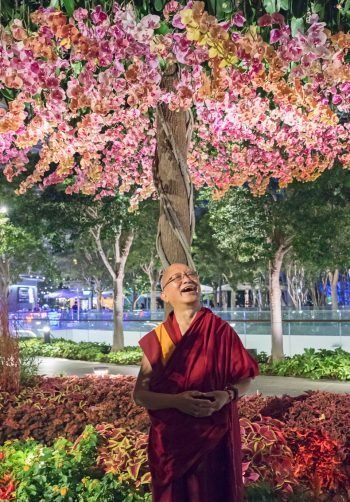
The cover photo for Enjoy Life Liberated from the Inner Prison by Lama Zopa Rinpoche; Rinpoche is enjoying the flower offerings at the Jewel, Singapore, 2019. Photo by Ven. Lobsang Sherab.
Enjoy Life Liberated from the Inner Prison is a new book from Lama Zopa Rinpoche.
Lama Zopa Rinpoche, who serves as the spiritual director of the Liberation Prison Project, asked Ven. Robina Courtin, who ran the project until 2009, to compile the more than one hundered letters he had written over the years in response to people in prison who’d contacted him. She edited Rinpoche’s spiritual advice into a narrative that covers all points of the path to enlightenment.
About the book: “Direct and uncompromising, Rinpoche makes it crystal clear that being in prison is a perfect opportunity for developing the radical approach, perfected by all great Tibetan practitioners, of transforming despair and hopelessness into happiness and liberation.
“The extent of the heartfelt compassion and love that Rinpoche offers the people who write to him is incredible. He empowers them to never give up on the development of their potential and their ability to help others.
“This advice is not just for prisoners. It is for all of us.”
Here’s a short excerpt from Chapter 1:
Prison Is Not the Real Prison
Living one’s life under the control of ignorance is actually the heaviest prison—and everyone is living in it.
The inner prison
People who are not in prison think that only people like you are in prison, but they have no idea about all the prisons they themselves are in. Ordinary people, those who are not practicing Dharma—including people from the courts, the police, kings, and presidents—are actually living in prison. People who are free to travel around, going wherever they want, doing whatever they like, or billionaires who think they have everything, all the desire objects, are all living in prison. Your external prison, the building you live in, is nothing in comparison with their inner prisons! It is very important to look at other sentient beings in this world and see how much they are suffering. They are the real prisoners. There are so many examples of this, people who are suffering so much, their inner life is so miserable, they are crying and unhappy. Wealthy people, for example, having so many things but still not having found satisfaction, can be more unhappy than people who have very little. Even if they’re billionaires, trillionaires, zillionaires, living in a house made of diamonds, with billons of cars, swimming pools, millions of servants—they are not happy. Some years ago, the most successful person of the year was on the cover of Time magazine—successful in making money, that is. After he became rich he couldn’t even go outside, because he was so scared that people would kidnap him. So he stayed inside his whole life, which means it was exactly like living in prison, mentally living in prison, and mentally suffering even more than a person in prison. So much suffering!
The prison of wrong concepts
In fact, we are all in these inner prisons. We are trapped in the prison of wrong concepts: believing that impermanent phenomena are permanent; believing that samsaric temporal pleasure is happiness; believing that the body, which is only a container of dirty things, is clean. There are so many wrong concepts and views, and these prisons are from time without beginning.
The prison of attachment
We are living in the most harmful prison, the prison of attachment, of desire. Normally we live just for this life’s happiness. We look at samsara as if it’s a beautiful park, but in reality it is suffering. When we live with attachment—doing the things that attachment wants twenty-four hours a day, always working for attachment, always clinging to this life—all our actions become negative karma, the cause of samsara. Attachment traps us like a fly trapped in the hot wax of a burning candle. It overtakes us like a giant tidal wave. The result is so many problems, one after the other. Our heart is filled with misery. There is no peace. There is only confusion and dissatisfaction.
The prison of anger
And when we don’t succeed in getting what our attachment wants, anger arises and we harm other sentient beings, thus destroying the causes of our happiness, our merit and good karma. Our mind is wild, not only now but since beginningless rebirths. We are wild, out of control, like a mad elephant.
The prison of self-cherishing
We live in the prison of self-cherishing, living our life with self-cherishing thought. We feel this self is the most important one, more precious than others, the most precious one among all sentient beings. Perhaps we think that we are the most important one even among all the holy beings, the buddhas and bodhisattvas! When we follow the self- cherishing thought, whatever we do, all the actions of our body, speech, and mind, become an obstacle to achieving happiness and, eventually, enlightenment, and an obstacle to liberating numberless sentient beings from the oceans of samsaric suffering and leading them to enlightenment. …
For more on Lama Zopa Rinpoche’s new book Enjoy Life Liberated from the Inner Prison and to read the complete first chapter:
EnjoyLifeLiberatedFromTheInnerPrison.com
Enjoy Life Liberated from the Inner Prison has been published as a fundraiser for Liberation Prison Project by Lama Yeshe Wisdom Archive and sponsored by The Bodhichitta Trust. For the past twenty-five years the Liberation Prison Project has been a lifeline for people in prison worldwide, who turned to it for Buddhist books and spiritual advice in an effort to find meaning in life when everything else was lost.
Lama Zopa Rinpoche is the spiritual director of the Foundation for the Preservation of Mahayana Tradition (FPMT), a Tibetan Buddhist organization dedicated to the transmission of the Mahayana Buddhist tradition and values worldwide through teaching, meditation and community service.
15
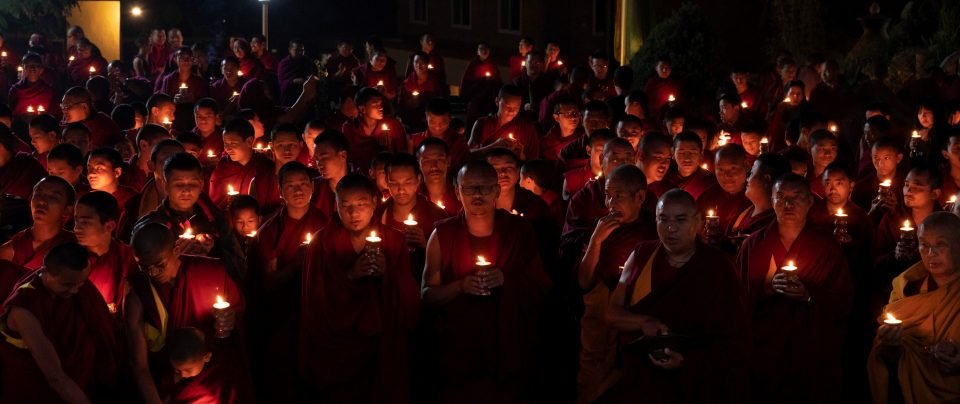
Kopan monks making light offerings on Lama Tsongkhapa Day, December 10, 2020, Kopan Monastery. Photo by Ven. Lobsang Sherab.
Lama Tsongkhapa Day, or Ganden Ngamchoe, is a celebration of the anniversary of Lama Tsongkhapa’s parinirvana. It is celebrated on the 25th day of the 10th month of the Tibetan calendar. This year, Lama Tsongkhapa Day fell on December 10.
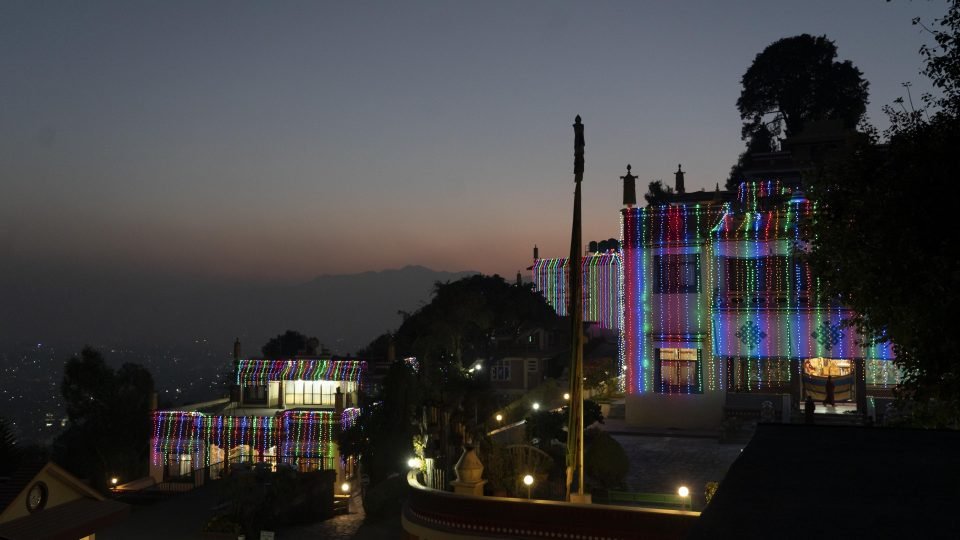
Lama Tsongkhapa Day light offerings at Kopan Monastery, December 10, 2020. Photo by Ven. Lobsang Sherab.
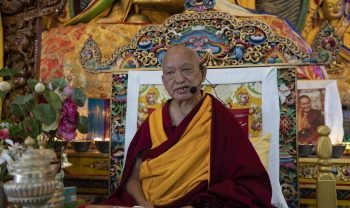
Lama Zopa Rinpoche teaching at Kopan Monastery on Lama Tsongkhapa Day, December 10, 2020. Photo by Ven. Lobsang Sherab.
Kopan Monastery offered a variety of auspicious activities on this occasion. We are pleased to share this short video of some of the events of the day, including a Heruka Lama Chopa in the morning, the Kopan Lama Gyupas taking Guhyasamaja self initiation, and a clip of Lama Zopa Rinpoche sharing this about light offerings: “Light offering is very important, in particular, by making light offerings you are able to dispel the darkness of ignorance and develop Dharma wisdom. Any light offering can dispel darkness, it doesn’t have to be just a butter lamp. You can offer electric lights and even the sun.”
The video ends with many monks making light offerings in the dark while circumambulating the stupas on the Kopan grounds.
https://youtu.be/YT0cwI9PEoA
Please join us in rejoicing in all of the powerful and merit-making activities offered around the world in celebration of Lama Tsongkhapa.
Lama Zopa Rinpoche is the spiritual director of the Foundation for the Preservation of Mahayana Tradition (FPMT), a Tibetan Buddhist organization dedicated to the transmission of the Mahayana Buddhist tradition and values worldwide through teaching, meditation, and community service.
Watch the video series Lama Zopa Rinpoche’s Teachings on Thought Transformation during the Time of COVID-19 and find links to videos in transcripts, MP3s, additional practice advice, and more:
https://fpmt.org/fpmt/announcements/resources-for-coronavirus-pandemic/advice-from-lama-zopa-rinpoche-for-coronavirus/
- Tagged: kopan monastery, lama tsongkhapa day, light offering, video
- Home
- News/Media
- Study & Practice
- About FPMT Education Services
- Latest News
- Programs
- New to Buddhism?
- Buddhist Mind Science: Activating Your Potential
- Heart Advice for Death and Dying
- Discovering Buddhism
- Living in the Path
- Exploring Buddhism
- FPMT Basic Program
- FPMT Masters Program
- FPMT In-Depth Meditation Training
- Maitripa College
- Lotsawa Rinchen Zangpo Translator Program
- Universal Education for Compassion & Wisdom
- Online Learning Center
- Prayers & Practice Materials
- Overview of Prayers & Practices
- Full Catalogue of Prayers & Practice Materials
- Explore Popular Topics
- Benefiting Animals
- Chenrezig Resources
- Death & Dying Resources
- Lama Chopa (Guru Puja)
- Lama Zopa Rinpoche: Compendium of Precious Instructions
- Lama Zopa Rinpoche: Life Practice Advice
- Lama Zopa Rinpoche Practice Series
- Lamrim Resources
- Mantras
- Prayer Book Updates
- Purification Practices
- Sutras
- Thought Transformation (Lojong)
- Audio Materials
- Dharma Dates – Tibetan Calendar
- Translation Services
- Publishing Services
- Teachings and Advice
- Find Teachings and Advice
- Lama Zopa Rinpoche Advice Page
- Lama Zopa Rinpoche: Compendium of Precious Instructions
- Lama Zopa Rinpoche Video Teachings
- ༧སྐྱབས་རྗེ་བཟོད་པ་རིན་པོ་ཆེ་མཆོག་ནས་སྩལ་བའི་བཀའ་སློབ་བརྙན་འཕྲིན།
- Podcasts
- Lama Yeshe Wisdom Archive
- Buddhism FAQ
- Dharma for Young People
- Resources on Holy Objects
- Ways to Offer Support
- Centers
- Affiliates Area
- Teachers
- Projects
- Charitable Projects
- Make a Donation
- Applying for Grants
- News about Projects
- Other Projects within FPMT
- Support International Office
- Projects Photo Galleries
- Give Where Most Needed
- FPMT
- Shop
Translate*
*powered by Google TranslateTranslation of pages on fpmt.org is performed by Google Translate, a third party service which FPMT has no control over. The service provides automated computer translations that are only an approximation of the websites' original content. The translations should not be considered exact and only used as a rough guide.The mental pollution of misconceptions is far more dangerous than drugs. Wrong ideas and faulty practice get deeply rooted in your mind, build up during your life, and accompany your mind into the next one. That is much more dangerous than some physical substance.







